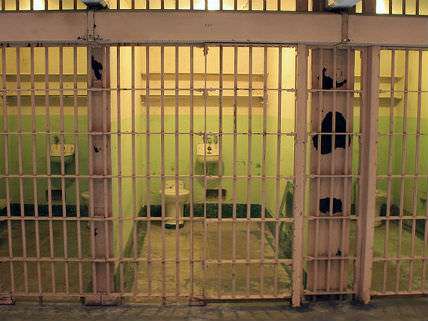Child Molesters Face Shorter Sentences Than Child Porn Viewers. That's Wrong.
Understanding why the folks who look at kiddie porn often get longer sentences than the people who molest children in real life.

Here's a weird criminal justice fact: The folks who look at kiddie porn often get longer sentences than the people who molest children in real life.
Reporter Lex Talamo at The Shreveport Times just delved into this disparity, and found a dismayingly simple reason for it. Charges against actual child rapists are hard to prove. Kids can be unreliable witnesses, and often the social dynamics are thorny. The perp could be a family member that loved ones don't want to see go to jail, or the accusations can come out long after the act.
But child porn? There it is on the computer. It's a simple slam dunk for prosecutors. And so, Talamo writes:
The conviction rate in U.S. child pornography possession cases is 97 percent, according to the Crimes Against Children Research Center and the Bureau of Justice Statistics. The conviction rate is much lower for offenders who commit hands-on sex crimes against children: 46 percent.
Talamo looks at the case of Nathaniel Kelly, a man found guilty of raping sisters aged 9 and 11, who were friends of the family.
At that age, they were less likely to fight back. More likely to stay silent. Easier targets.
For these rapes, Kelly got 17 years in prison.
Talamo contrasts Kelly's crime with that of Jesse Ward, a guy who shared a single kiddie porn picture with an undercover cop. A later search of Ward's computer found more than 10 such images.
A former cop and preschool teacher, Ward used a peer-to-peer network that is part of the harder-to-access dark web to share a single image of child pornography with an online undercover agent in 2007. Ward had no contact with the child victim in the image, and he had no previous criminal record.
Ward is serving 20 years for those pictures.
The argument for such long sentences is that someone, somewhere, abused a child, and by possessing the image of that abuse, the child porn viewer is supporting the abuser.
This was certainly true in the age when child porn was only available in the back of adult book stores, and the money spent on the photos went to the people involved in their creation and distribution. But now that child porn is ubiquitous—and often free—the people downloading it are no longer financially supporting the perps.
What's more, the child porn laws were written for an era when "transporting the images across state lines" meant doing a lot more than simply pressing a button. But for Ward:
The transportation charge applied because he had uploaded the image to a network from which users in other states could download it—thus crossing state lines, a distinction that gained his crime federal status.
Distribution charges carry mandatory minimums of five to 20 years behind bars under Louisiana state law. Actual, hands-on child molesting, "a lewd or lascivious act on a child under age 17," carries a penalty of 5 to 10 years behind bars.
No one is in favor of child porn. Everyone would like to see the people who create it face justice. But treating the viewing of illegal images as more egregious than physically molesting a child makes no sense.


Show Comments (19)